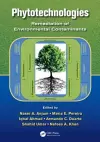
Phytotechnologies
6 contributors - Hardback
£220.00
Teresa Rocha-Santos has graduated in Analytical Chemistry (1996), obtained a PhD in Chemistry (2000) and an Aggregation in Chemistry (2018), both at the University of Aveiro, Portugal. Presently, she is a Principal Researcher at Centre for Environmental and Marine Studies (CESAM) & Department of Chemistry of University of Aveiro (since 2014) and Vice-coordinator of CESAM research centre (from 2021). Her research concentrates on the development of new analytical methodologies fit for purpose and on the study of emerging contaminants (such as microplastics) fate and behaviour in the environment and during wastewater treatment. She published 170 scientific papers (Oct 2021) and has an h-index of 43 (Oct 2021). She is the editor of 7 Books. She is a member of the editorial board of Current Opinion in Environmental Science and Health, Elsevier (since 2017), Data in brief, Elsevier (since 2018), Science of the Total Environment, Elsevier (since 2018), Sensors, MDPI (since 2018), Molecules, MDPI (since 2018), Associate Editor of Euro-Mediterranean Journal for Environmental Integration, Springer (since 2016), and Associate Editor of Journal of Hazardous Materials (since 2019) and Co-Editor in Chief of Journal of Hazardous Materials Advances (since 2021). Prof. Armando C. Duarte (http://www.cesam.ua.pt/aduarte) graduated in Chemical Engineering (1977) at the University of Oporto (Portugal) and obtained a PhD in Public Health Engineering (1981) at the University of Newcastle-upon-Tyne (United Kingdom). In 2006, The Portuguese Science Foundation (www.fct.pt) awarded him a prize for Scientific Excellence and in 2013 he became a Member of the FCT Scientific Council for Natural and Environmental Sciences. He is a Professor of Environmental & Analytical Chemistry at the University of Aveiro (Portugal) since 1995, leader of a research group on the same subject, lecturer on Anaytical Quality Control subjects, and either supervising or co-supervising many PhD students, some of whom became members of staff, both as lecturers and researchers. His highly-interdisciplinary research spans areas of comprehensive environmental and analytical chemistry, qualimetrics and analytical quality assurance, but also includes the assessment of the relevance of new concepts and integration of different ideas into widely accepted frameworks, especially when applied to sustainability. He co-authored more than 450 peer-reviewed publications leading to an h-factor of 38.